Join in 外研剑桥英语四年级上册Review Unit 4 - Unit 6课件(共37张PPT)
文档属性
| 名称 | Join in 外研剑桥英语四年级上册Review Unit 4 - Unit 6课件(共37张PPT) |
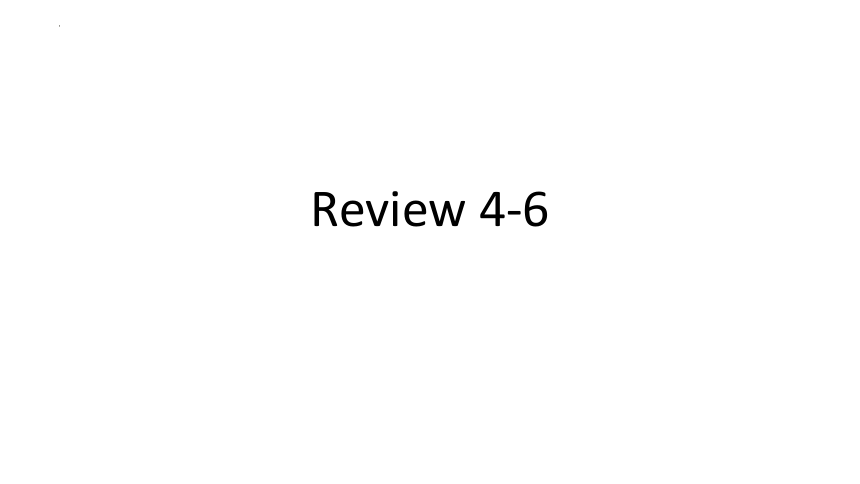
|
|
| 格式 | zip | ||
| 文件大小 | 5.0MB | ||
| 资源类型 | 教案 | ||
| 版本资源 | 外研版(刘兆义主编) | ||
| 科目 | 英语 | ||
| 更新时间 | 2022-07-19 21:30:52 | ||
图片预览

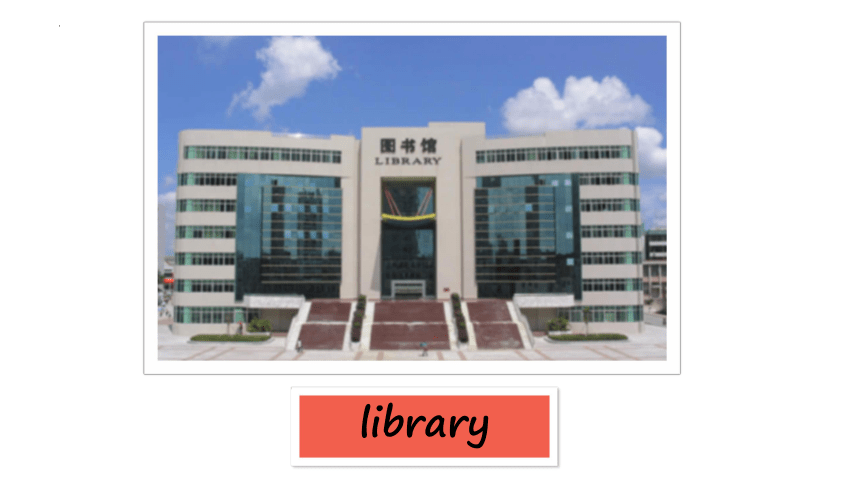
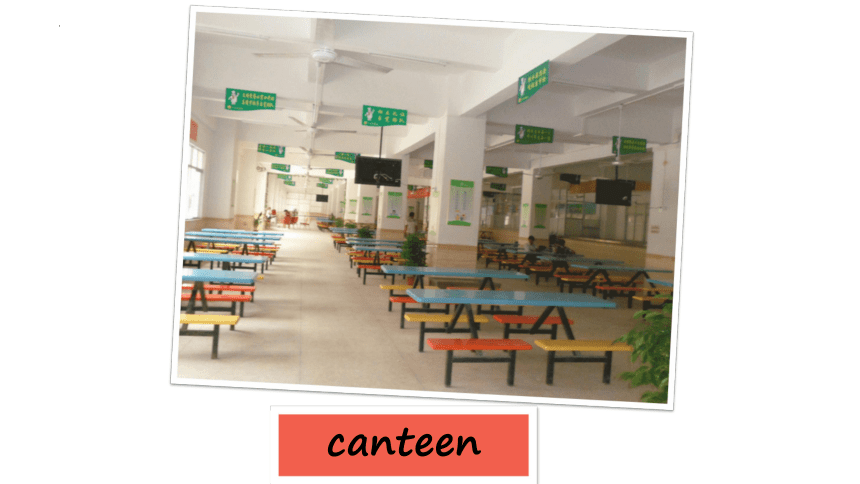



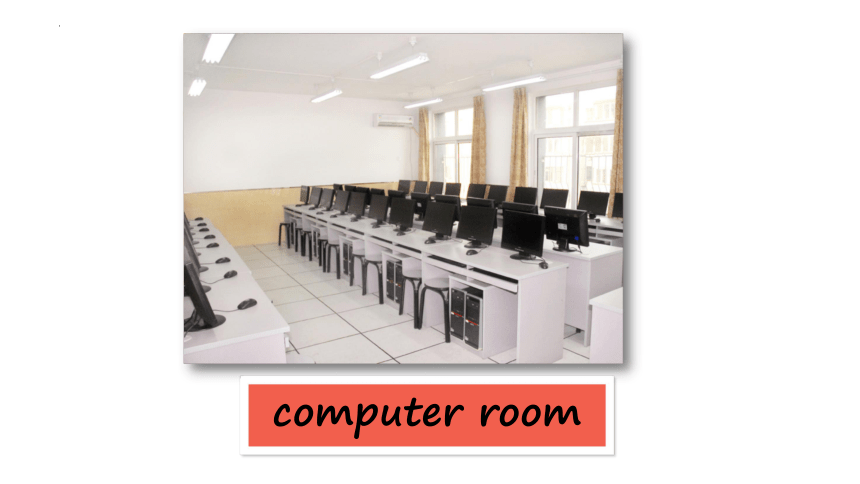
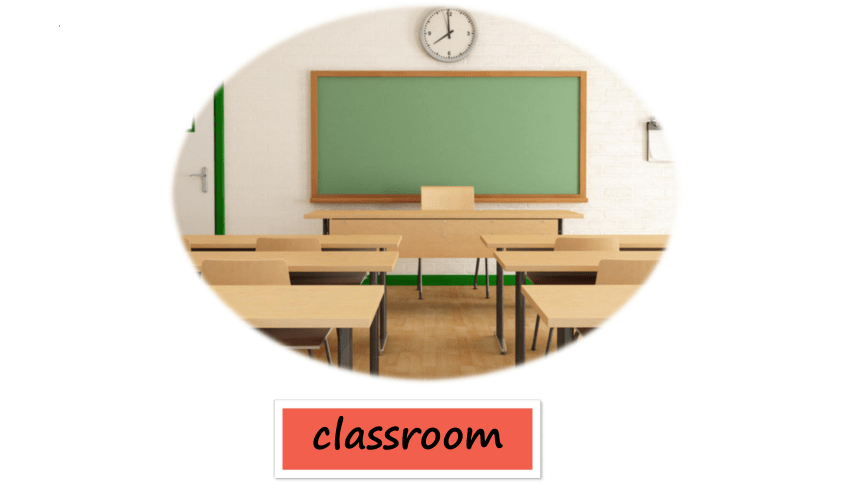
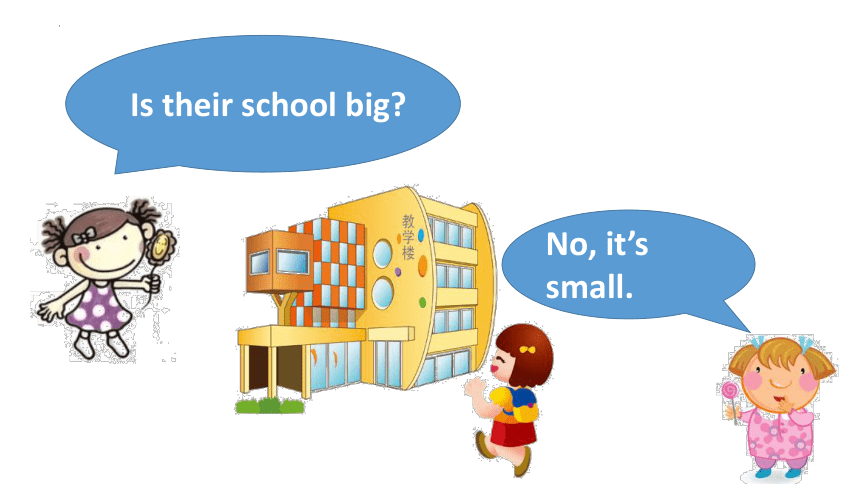

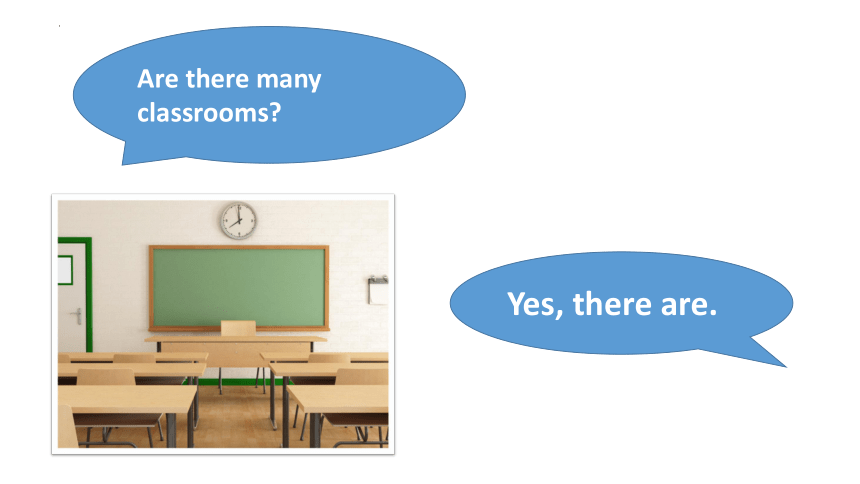

文档简介
(共37张PPT)
Review 4-6
library
canteen
playground
gym
36%
Woman
26%
Kid
computer
computer room
36%
Woman
48%
Man
26%
Kid
classroom
Is their school big
No, it’s small.
Is there a library
Yes, there is.
Are there many classrooms
Yes, there are.
Are there many books in it
Yes, there are.
Grammar
I 用am, you用are, is 连着他她它。
eg: I am from China. 我来自中国。
He is from Japan. 他来自日本。
She is from Britain. 她来自英国。
2. have got表示“有”
I/You/We + have got He/She/It/人名+has got
eg: I have got black hair. 我有黑色的头发。
He /She has got red hair. 他/她有红色的头发。
主语是第三人称单数时,谓语动词+“s”
eg: He /She likes Art. 他/她喜欢美术。
We have classes in the classroom.
We often read in the library.
We have lunch in the canteen.
We play sports on the playground.
We have computer class in the computer room.
________ is Mary.
A. He B. She C.her
He _______ dogs.
A.likes B.like C.liking
Tim _______ got black hair.
A.is B.has C.have
B
A
B
Mr Crow ________ from Britain.
A.am B.is C.are
_______ there a canteen in your school
A. Is B. Are C. Do
B
A
一.读句子,判断句子中是否有错误,对(√)错(×)
( )1. They is from Britain.
( )2. I have get red coat.
( )3. He is our Art teacher.
( )4. Where is my pencil case
( )5. Here’s my prize.
( )6. She am ten.
( )7. He is our school teachers.
×
×
√
√
√
×
×
情景交际
1. 当你想问别人的家是否很大时,你可以问:
Is your home big
2. 当你想告诉别人你有一个铅笔盒时,你可以说:
I’ve got a pencil case.
3. 当你想让别人帮助你时,你可以说:
Help me, please.
4. 当你想说她喜欢在图书馆读书时,你可以说:
She likes reading books in the library.
5. 当你想问别人那里是否有体育馆时,你可以问:
Is there a gym
draw
She can draw.
Let's learn.
sing
He can sing.
Let's learn.
swim
They can swim.
Let's learn.
dance
She can dance.
Let's learn.
fly a kite
He can fly a kite.
Let's learn.
play football
play basketball
play table tennis
guitar
play the guitar
Let's learn.
play the piano
ride a horse
He can ride a horse.
Let's learn.
stand on my head
I can stand on my head.
Let's learn.
二、重点句子
(1) I can sand on my head. 我会倒立
I can’t ski. 我不会滑雪
Can you play table tennis 你会打乒乓球吗
Yes, I can./ No, I can’t. 是的,我会/不,我不会。
(2)He can stand on his head. 他会倒立。
He can’t play the piano. 他不会弹钢琴。
Can he play football 他会踢足球吗?
Yes, he can./ No, he can’t. 是的,他会/不,他不会。
(3)She can stand on her head. 她会倒立。
She can’t swim. 她不会游泳。
Can she ride a horse 她会骑马吗?
Yes, she can./No, she can’t. 是的,她会/不,她不会。
四、重点语法
1.can 和can not
can是一个情态动词,表示“能,可以”的意思,用法也非常的简单,只要直接把句子的主语放在“can”的前面就可以了,比如:
I can swim. 我会游泳。
He can skate. 他会滑冰。
We can sing English songs. 我们会唱英文歌。
相反can not,表示“不能……”也非常的简单,只要在“can”的后面加上 “not”就可以了,当然“cannot”是全称,它还可缩写成“can’t” ,如:
I can’t sing. 我不会唱。
He can’t skate. 他不会滑冰。
We can’t sing English songs. 我们不会唱英文歌。
2.一般疑问句
(1)定义:用来提出问题的句子叫做一般疑问句,句末要用问号。
Are you a teacher 你是一个老师吗?
Are you smith
(2)一般疑问句通常是以be, have 助动词或情态动词开头,回答时用Yes 或No.朗读时用升调
Are you from Germany 你是来自德国的吗?
Does he often swim in summer 他夏天经常游泳吗?
(3)一般疑问句的肯定回答用Yes,后接肯定结构,否定回答用No,后接否定结构。
Do you like dogs 你喜欢狗吗?
Yes, I do
No, I do not
一、针对下列问题,作简单的回答。
1.Does John pass the exam Yes,_____________
2.Is there anyone at home No,______________
3.Are you enjoying your English lessons Yes,_____________
4.Can the computer work now No,_____________
5.Has Mr. Lee come back from his holiday No,_____________
he does
there isn’t.
Yes, I am
it can’t.
No, he hasn’t
陈述句变一般疑问句
1. His father is an English teacher.
__________________________________________________________________
2. These cats are crying.
__________________________________________________________________
3. They can swim.
__________________________________________________________________
4. I like to read English.
__________________________________________________________________
5. I go to school on foot.
__________________________________________________________________
Is his father an English teacher
Are these cats crying
Can they swim
Do you like to read English
Do you go to school on foot
用do does be 填空
1. _____ she know all the answers
Yes, she ____. No, she _____.
2._____ the twins often fight
Yes, _____ do. No, _____ don’t.
3._____ your dad like listening to music
Yes ,____ does . No, _____ doesn’t.
4._____ uncle Tom wash his car every day
Yes , ____ does . No, ____ doesn’t.
5. _____ you have a new teacher
Yes, I ______. No, I ______.
Does
does
doesn’t
Do
they
they
Does
he
he
Does
he
he
Do
do
don’t
Review 4-6
library
canteen
playground
gym
36%
Woman
26%
Kid
computer
computer room
36%
Woman
48%
Man
26%
Kid
classroom
Is their school big
No, it’s small.
Is there a library
Yes, there is.
Are there many classrooms
Yes, there are.
Are there many books in it
Yes, there are.
Grammar
I 用am, you用are, is 连着他她它。
eg: I am from China. 我来自中国。
He is from Japan. 他来自日本。
She is from Britain. 她来自英国。
2. have got表示“有”
I/You/We + have got He/She/It/人名+has got
eg: I have got black hair. 我有黑色的头发。
He /She has got red hair. 他/她有红色的头发。
主语是第三人称单数时,谓语动词+“s”
eg: He /She likes Art. 他/她喜欢美术。
We have classes in the classroom.
We often read in the library.
We have lunch in the canteen.
We play sports on the playground.
We have computer class in the computer room.
________ is Mary.
A. He B. She C.her
He _______ dogs.
A.likes B.like C.liking
Tim _______ got black hair.
A.is B.has C.have
B
A
B
Mr Crow ________ from Britain.
A.am B.is C.are
_______ there a canteen in your school
A. Is B. Are C. Do
B
A
一.读句子,判断句子中是否有错误,对(√)错(×)
( )1. They is from Britain.
( )2. I have get red coat.
( )3. He is our Art teacher.
( )4. Where is my pencil case
( )5. Here’s my prize.
( )6. She am ten.
( )7. He is our school teachers.
×
×
√
√
√
×
×
情景交际
1. 当你想问别人的家是否很大时,你可以问:
Is your home big
2. 当你想告诉别人你有一个铅笔盒时,你可以说:
I’ve got a pencil case.
3. 当你想让别人帮助你时,你可以说:
Help me, please.
4. 当你想说她喜欢在图书馆读书时,你可以说:
She likes reading books in the library.
5. 当你想问别人那里是否有体育馆时,你可以问:
Is there a gym
draw
She can draw.
Let's learn.
sing
He can sing.
Let's learn.
swim
They can swim.
Let's learn.
dance
She can dance.
Let's learn.
fly a kite
He can fly a kite.
Let's learn.
play football
play basketball
play table tennis
guitar
play the guitar
Let's learn.
play the piano
ride a horse
He can ride a horse.
Let's learn.
stand on my head
I can stand on my head.
Let's learn.
二、重点句子
(1) I can sand on my head. 我会倒立
I can’t ski. 我不会滑雪
Can you play table tennis 你会打乒乓球吗
Yes, I can./ No, I can’t. 是的,我会/不,我不会。
(2)He can stand on his head. 他会倒立。
He can’t play the piano. 他不会弹钢琴。
Can he play football 他会踢足球吗?
Yes, he can./ No, he can’t. 是的,他会/不,他不会。
(3)She can stand on her head. 她会倒立。
She can’t swim. 她不会游泳。
Can she ride a horse 她会骑马吗?
Yes, she can./No, she can’t. 是的,她会/不,她不会。
四、重点语法
1.can 和can not
can是一个情态动词,表示“能,可以”的意思,用法也非常的简单,只要直接把句子的主语放在“can”的前面就可以了,比如:
I can swim. 我会游泳。
He can skate. 他会滑冰。
We can sing English songs. 我们会唱英文歌。
相反can not,表示“不能……”也非常的简单,只要在“can”的后面加上 “not”就可以了,当然“cannot”是全称,它还可缩写成“can’t” ,如:
I can’t sing. 我不会唱。
He can’t skate. 他不会滑冰。
We can’t sing English songs. 我们不会唱英文歌。
2.一般疑问句
(1)定义:用来提出问题的句子叫做一般疑问句,句末要用问号。
Are you a teacher 你是一个老师吗?
Are you smith
(2)一般疑问句通常是以be, have 助动词或情态动词开头,回答时用Yes 或No.朗读时用升调
Are you from Germany 你是来自德国的吗?
Does he often swim in summer 他夏天经常游泳吗?
(3)一般疑问句的肯定回答用Yes,后接肯定结构,否定回答用No,后接否定结构。
Do you like dogs 你喜欢狗吗?
Yes, I do
No, I do not
一、针对下列问题,作简单的回答。
1.Does John pass the exam Yes,_____________
2.Is there anyone at home No,______________
3.Are you enjoying your English lessons Yes,_____________
4.Can the computer work now No,_____________
5.Has Mr. Lee come back from his holiday No,_____________
he does
there isn’t.
Yes, I am
it can’t.
No, he hasn’t
陈述句变一般疑问句
1. His father is an English teacher.
__________________________________________________________________
2. These cats are crying.
__________________________________________________________________
3. They can swim.
__________________________________________________________________
4. I like to read English.
__________________________________________________________________
5. I go to school on foot.
__________________________________________________________________
Is his father an English teacher
Are these cats crying
Can they swim
Do you like to read English
Do you go to school on foot
用do does be 填空
1. _____ she know all the answers
Yes, she ____. No, she _____.
2._____ the twins often fight
Yes, _____ do. No, _____ don’t.
3._____ your dad like listening to music
Yes ,____ does . No, _____ doesn’t.
4._____ uncle Tom wash his car every day
Yes , ____ does . No, ____ doesn’t.
5. _____ you have a new teacher
Yes, I ______. No, I ______.
Does
does
doesn’t
Do
they
they
Does
he
he
Does
he
he
Do
do
don’t
